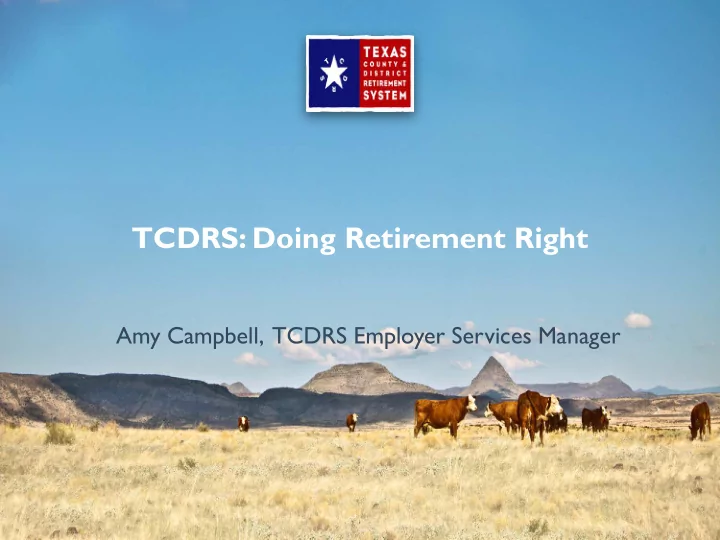

TCDRS: Doing Retirement Right Amy Campbell, TCDRS Employer Services Manager
294,000 More than members and retirees 760 employers $30B in assets 89% 8.8% funded 35-year return
Set Up for Success Created in 1967 by the Texas Legislature Managed independently by a nine-member board of trustees Manage $30 billion in assets as of Dec. 31, 2017 Operating costs average 0.26% of assets Receive no funding from the State of Texas
Benefits T exas $1.4 billion in benefits paid in 2017 – 96% stays in Texas Supports: – $2 billion in total economic output – 14,752 jobs created – $1.1 billion added to Texas GDP
TCDRS Does Retirement Right Savings-based benefits Responsible plan funding Flexibility and local control
TCDRS Does Retirement Right Savings-based benefits – Members save over their careers for retirement – Savings earn 7% , set by statute – At retirement, benefit is based on savings account balance and employer matching
T exans Earn Reasonable Benefits Averages as of Dec. 31, 2017 Years of TCDRS Service Current Annual Age at Retirement at Retirement Benefit 61 18 $22,764
TCDRS Does Retirement Right Responsible plan funding – Employers pay 100% of required contributions – Nearly 35% of employers make additional contributions – 2019 estimated weighted-average required employer contribution rate is 11.57%
Investment Income Funds Benefits Employee Deposits Employer Contributions Investment Income Estimated
Diversified Portfolio Reduces Risk As of April 1, 2018
Investment Returns (Net of All Fees) Estimated as of Dec. 31, 2018 Annualized 2018 5 10 15 20 25 30 35 Returns Return Year Year Year Year Year Year Year T otal Fund -3.0% 4.9% 8.9% 6.2% 6.4% 7.0% 8.0% 8.8% Benchmark -4.1% 3.9% 8.0% 5.6% 5.5% 6.0% 6.9% 7.6% 13
TCDRS Returns 1999–2018 (Net of All Fees) Expected Risk & Return 28.0% 26.5 % 23.0% 20.1 % 16.4 18.0% 14.7 13.9 % 12.7 % % 12.6 13.0% % 9.4% % 12.6 7.9% % 8.0% 6.8% 7.5% 7.2% 3.0% 2.9% 1.3% 1.3% -0.7% -2.0% -1.2% -3.0% (Est.) -7.0% -12.0% -17.0% -22.0% -27.0% - 29.0% -32.0%
TCDRS Does Retirement Right Flexibility and local control – Employers choose benefit levels based on their local needs and budgets – Employers may increase or reduce benefits by adjusting the employee deposit rate or employer matching
Case Study: Harris County After rate increase due to 2008 Great Recession: – Reduced benefits by lowering employee deposit rate from 7% to 6% – Experienced immediate rate relief – Employees could choose to put the difference in voluntary 457 if wanted to save for retirement. Otherwise, it increased net pay. When economy rebounded: – Increased deposit rate back to 7% with salary increase to offset – Subsequently adopted an elected rate to improve funding
Stabilize Rates Contribute at a higher elected rate or make an additional contribution – Allows employers to prefund benefit increases – Provides a cushion against possible future negative plan experience, such as investment losses
Case Study: Tarrant County Adopted elected rate significantly greater than required rate This policy: – Has improved funding – Provides budget stability – Funds retiree COLAs – Establishes plan level reserves to offset adverse markets Even with the 2018 investment returns, required rate is projected to remain stable from 2019 to 2020
How Employer Rates Are Determined Each year, TCDRS actuaries look at each plan to determine the required contribution rate. Study workforce and estimate benefits employer will pay Estimate the value of future benefits in today’s dollars Compare plan assets with estimate of benefits Determine a rate to appropriately fund benefits while keeping rates stable
When You Review Your Plan January thru April: May thru December: Actuaries perform plan valuation Employers make plan decisions JULY. OCT. APR. JAN. JAN. 1 1 1 1 1 Dec. 16: Dec. 31: May 1: July: Actuaries take a Plan changes due TCDRS Annual Rate information snapshot of your plan and Plan Conference Jan. 1: Customizer New rate goes into available effect
Providing a Secure Retirement Benefit C A R E E R
Providing a Secure Retirement Benefit R E T I R E M E N T
Other Ways to Earn Service Time = Proportionate Military or Retirement Multiple USERRA Program TCDRS ERS (State of Texas) Accounts JRS (Courts) TRS (Schools) TMRS (Select Cities) COA (City of Austin)
Survivor Benefit Earned after 4 years of TCDRS service Gives beneficiaries the option to receive a lifetime monthly benefit from the account, if the member were to pass away before retirement Beneficiaries don’t have to wait until that member would have become eligible to retire Gives loved ones peace of mind
Vesting Vested after 5, 8 or 10 years of service Set by each employer Means you’ve earned the right to a lifetime benefit when you’re eligible and choose to retire
Retirement Eligibility Vesting + Eligibility = Lifetime Monthly Benefit Age 60 and 5,8, or 10 Years Age plus Years of Service* =75 or 80 Any Age and 20 or 30 Years * Employee must be vested.
Benefit Payment Options Single Life Guaranteed Term Dual Life • Highest monthly • Retiree receives • Select 100%, 75% payment lifetime monthly or 50% of payment payment to continue for • Payments stop when beneficiary’s lifetime retiree • If retiree passes away passes away before the end of term, • Variation: 100% beneficiary receives to beneficiary with pop-up • Select multiple benefit for remainder option beneficiaries, change if of term (term begins on needed • Only select one retirement date) beneficiary, no changes • Select multiple beneficiaries, change if needed
800-651-3848 employerservices@tcdrs.org
Questions? www.TCDRS.org
Recommend
More recommend